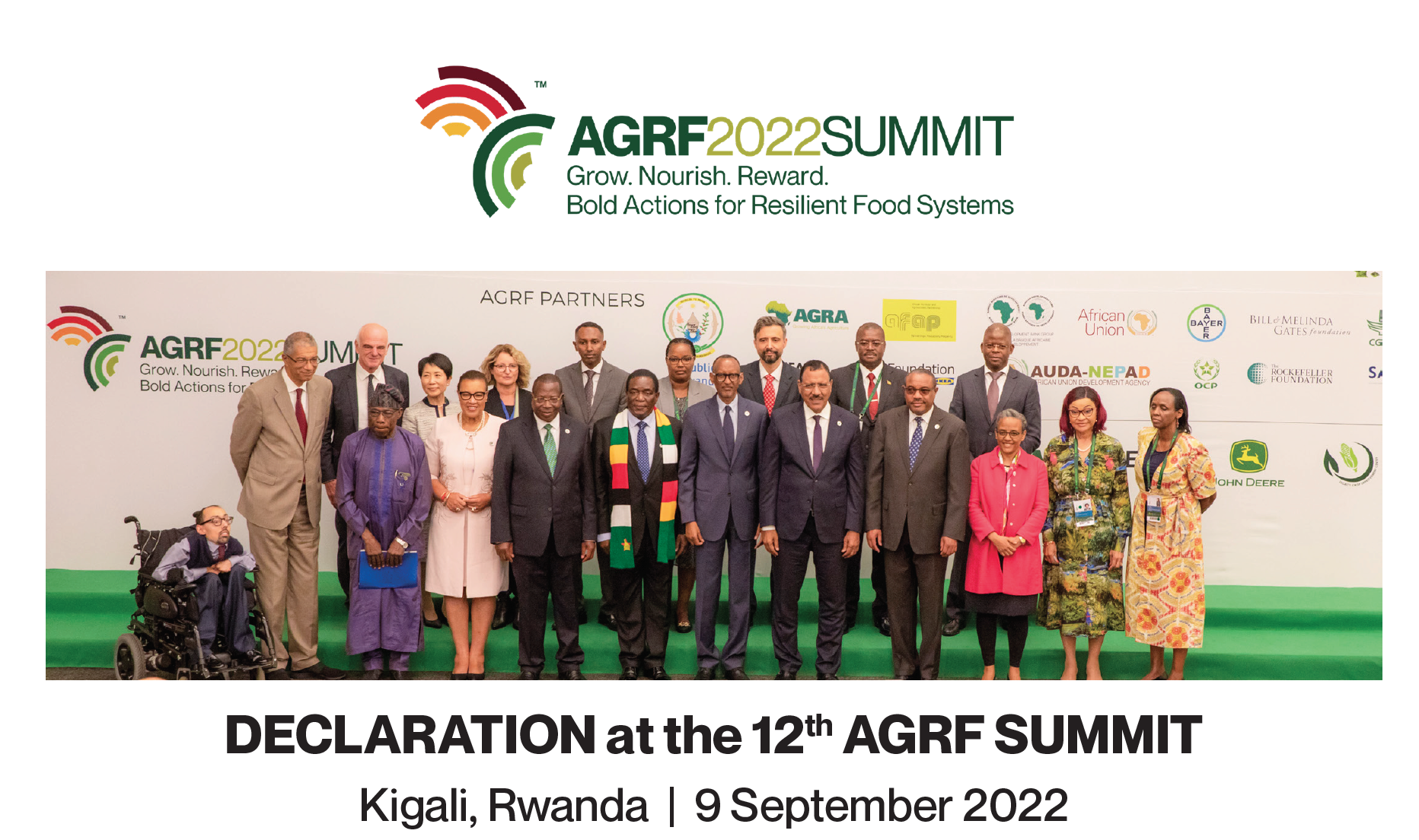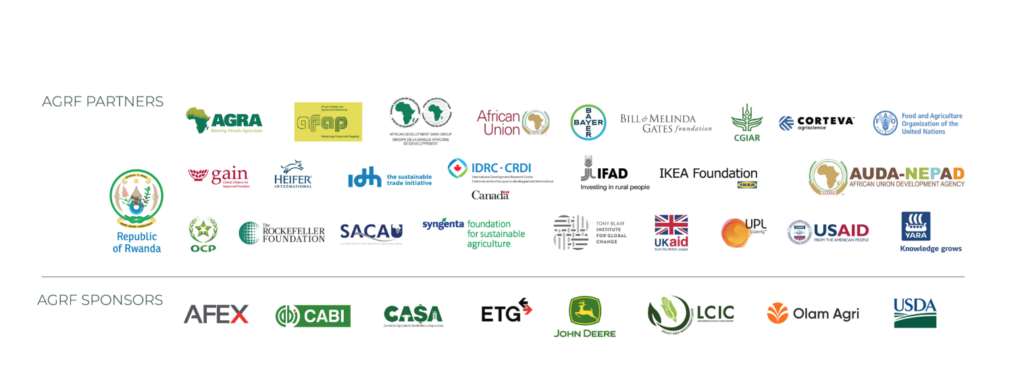
DECLARATION at the 12th AGRF SUMMIT
DECLARATION at the 12th AGRF SUMMIT
Kigali, Rwanda | 9 September 2022
- We, the 6,467 participants of the Twelfth AGRF Summit came together in Kigali, Rwanda, from 5 to 9 September 2022 to commit to actions and support for the theme: Grow, Nourish and Reward – Bold Actions for Resilient Food Systems. We express our appreciation to the Government of Rwanda for hosting this event and its strong support for AGRF over the years. We appreciate the personal leadership of H.E. President Paul Kagame and the support of the Ministry of Agriculture and Animal Resources. Rwanda has been an inspiration to us all as host, and through its example across the country.
- This year’s AGRF, taking place as the continent continues to feel the shocks of successive crises, amplified our understanding of the vulnerability of our food systems. The COVID-19 pandemic placed extraordinary strain on our countries. Climate change is real, threatening livelihoods and increasing hunger. Our food systems are fragile. The price of food has risen by more than 40% since the beginning of Covid-19, and 147 million people are facing crisis levels of food insecurity – an increase of 20 million since the beginning of 2022. How did we get to this point?
- We have embraced food systems as the guiding principle to how we produce, process, market, and consume food. We will build resilience at every level of our agricultural value chains. Sustainable food systems are the only pathway to achieving the key sustainable development goal of ending hunger by 2030.
- Current and former leaders declared their commitment to supporting and driving efforts to build food security and transform food systems, and build a sustainable, profitable, and productive agricultural ecosystem in Africa. Leaders outlined their policy reforms and increased self-sufficiency following the COVID-19 pandemic. They voiced their determination to direct more resources to agriculture and committed to building stronger partnerships within and outside Africa, including with the Commonwealth member states.
- Heads of state stressed the need to boost Africa’s food production to reduce the need for imports and be better able to withstand shocks, and to increase public expenditure.
- We have agreed to accelerate investments in transport and storage infrastructure, while ministers have agreed to accelerate the harmonisation of our tariff systems. We call upon governments to accelerate the implementation of the African Continental Free Trade Area to build and integrate markets for our farmers and value addition in our products.
- We agreed to strengthen collaboration between key stakeholders to address the barriers to trade that impede the movement of food from areas of surplus to areas of deficit. Platforms such as the Food Trade Coalition for Africa that advocate for policy predictability and coordination of investments to drive regional food trade are critical to helping Africa successfully implement the African Continental Free Trade Area.
- We welcome the leadership of Ghana, Malawi and Rwanda in building country strategies and plans to transform their food systems. The AGRF summit agreed to prioritize: Support to country-led food systems transformation,
- development and implementation of city and municipal food systems visions
- elevating healthy diets, particularly in the AU year of nutrition, and
- showcasing models, best practices, evidence, and lessons learned for African food systems, and to disseminate them systematically through knowledge platforms.
- We are committed to confronting the threat posed by climate change. We agree to work with nature, allowing our land and biodiversity life-sources to regenerate, which builds resilience to climate change. Presidents and ministers reiterated the importance of limiting global temperature rise to 1.5C. The AGRF calls on global leaders to mobilise investment of $200 billion per year into adaptive food systems across Africa. We urge member states to address this and food systems transformation this November at COP27 in Sharm-el-Sheikh, with leaders agreeing to ensure a common African position at the summit.
- Healthy diets have become a critical component of food system dialogue. We are committed to promoting the fortification of staple and complementary foods to deliver better diets for children. Locally produced superfoods will be promoted, as the Republic of Rwanda has demonstrated with beans.
- We are committed as stakeholders to building the partnerships necessary for this continent to identify African solutions to African challenges. Food systems transformation depends on a broad coalition of people of all backgrounds, ethnicities and beliefs. Food systems transformation depends on inclusion, to eliminate inequality and harness opportunity.
- We emphasize the indispensable role of the private sector, requiring small, medium and large-scale enterprises to place food systems at the centre of their investment. Innovation in finance must be led and supported by governments and driven by entrepreneurs to reality.
- We have agreed to support SMEs and smallholder farmers as the biggest risk takers across the value chain, and to build their capacity to absorb shocks over multiple growing cycles. We have agreed to facilitate and increase investments across value chains, especially for smallholders. We are committed to accelerating access and affordability of finance with new tools and technological advancements.
- The Agribusiness Dealroom brought together 15 governments, 150 SMEs including youth and women entrepreneurs who engaged with more than 20 investors. The AGRF Dealroom will further develop, to turn opportunity into investment and business growth. The Dealroom will continue to work closely with governments to build investor confidence and secure increased private sector investment, especially in the areas of processing, logistics, technology, and development of “green parks”.
- The AGRF has become a platform to celebrate talent in Africa. We welcome the innovation displayed in the Africa Food prize, and congratulate the Ghanaian plant geneticist, Professor Eric Danquah as winner. He established a thriving model for agricultural education and has trained many scientists in the field in Africa. WE also embrace the young entrepreneurs and agripreneurs celebrated in the GO GETTAZ, Value4Her and AGRA Pitch AgriHack awards.
- The AGRF Summit 2022 marks a turning point for African agriculture and food systems. We call upon governments, development partners, civil society, the private sector, farmers to turn promises into action and investment. Africa’s food systems must transform, to fight poverty, eliminate hunger, and adapt to climate change.
-Ends-
